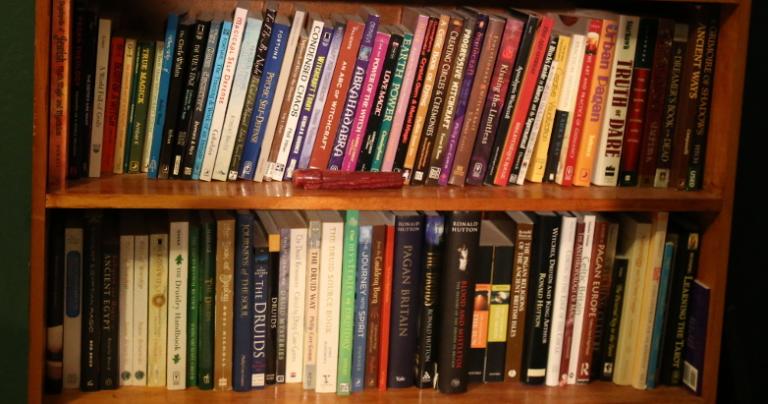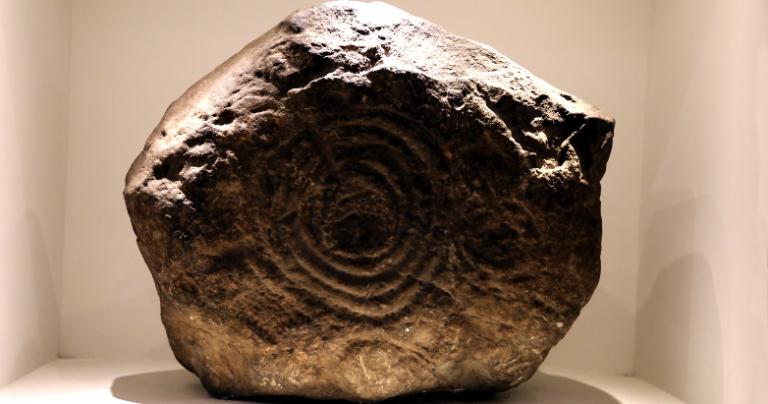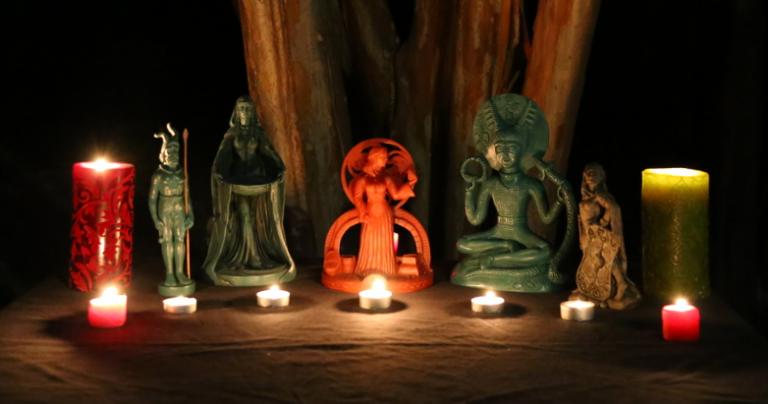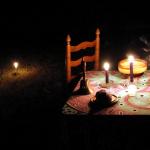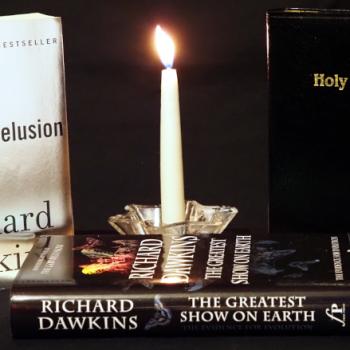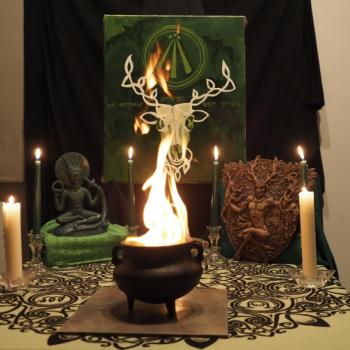A couple weeks ago I made a comment on a friend’s Facebook post about the differences between Christian religion and Pagan religion. In response, someone else (who I don’t know and therefore won’t name) said:
We aren’t interested in RELIGION and the chains they put our souls in, we are interested in our personal relationships and numinous experience with nature, elementals, and avatars like the Christ.
This is just so wrong.
It’s also quite common. There’s the Deepak Chopra quote that makes the rounds occasionally:
Religion is belief in someone else’s experience. Spirituality is having your own experience.
Also wrong.
If a blog post has “witchcraft” in the title, I can be sure it’s going to be widely shared. If it has “Paganism” in the title, it will do well. If it has “religion” in the title, it’s not going to go anywhere. Too many people are afraid of religion.
We see this in the whole “spiritual but not religious” movement. Some of this is an understandable reaction against negative religion, but much is an avoidance of the work required to build any real spiritual or religious depth.
On one hand, I get it. A lot of nasty, evil things have been done in the name of religion over the centuries. It’s still happening today, whether it’s Daesh blowing up statues and beheading infidels in the Middle East or Christian fundamentalists attacking LGBT rights in the United States. Of course, that ignores the many more Muslims who just want to live in peace and help the poor, and the Christians who just want to love their neighbors as themselves. Stereotypes are never helpful.
If all you want is some vague and trite spirituality that makes you feel good and tells you everything’s going to be OK whether it really is or not, go listen to a Joel Osteen sermon. But if you want a deep spiritual practice that will help you handle life’s challenges, build deep and meaningful relationships, and change yourself and the world, you’re going to need religion.
Religions are the accumulated wisdom of our ancestors and predecessors
So you want to have numinous experiences? How might you do that? “Just go outside and be open!”
OK, what time of day should I go outside? Where should I stand? Or should I sit? Do I have to go deep in the woods or is my back yard OK? Is there something I’m supposed to say? Something I’m supposed to do? How long do I have to stay?
What do I do if nothing happens?
Perhaps more importantly, what do I do if something does happen?
Numinous experiences can’t be forced, and sometimes they come out of the blue. Those times are magical and sacred. But if we count on random chance bringing them to us, we may be waiting for a very long time.
Fortunately, we don’t all have to figure this out for ourselves by trial and error. The world’s religions have practices that facilitate numinous experiences. Some are a few years old and others can be traced back to the dawn of humanity. Some we can learn from books and others need to be taught face to face. But by drawing on the collective experience of those who came before us, we can pick up where they left off without starting from ground zero.
And when something does happen, how do we figure out what it means? Religions provide frameworks for understanding our experiences and for interpreting them in the context of specific ideas about the world, how it works, and our place in it. The unfortunate tendency to assume everything is a “message” or a “lesson” is the natural result of interpreting spiritual experiences in the context of extreme individuality. With no wider context, many people assume it’s all about them, even though it isn’t. Religions provide context.
Religions forge relationships
The word “religion” has its roots in the Latin religare, meaning “to bind together.” A common religion binds people together in community around shared experiences, common traditions, and mutual support. Religions provide practices to bind us together with our Gods and other spiritual beings, and for living together in respect and reciprocity.
Good religion shows how our fates are inseparably intertwined with the fate of every other species and ecosystem on the Earth, and encourages us to care for them respectfully, whether because we see them as fellow persons, as the creations of an all-powerful deity, or simply because the Earth is the only planet we’ve got.
Having a numinous experience is great. But with the framework and accumulated knowledge of a religion, we can determine that our numinous experience was an encounter with a particular deity. We can then learn about this deity from the stories of our ancestors, and from the experiences of contemporary devotees. This helps us get to know Them, allowing us to form a relationship on a personal level, rather than just “that awesome feeling I got in the woods one day.”
Religions promote values
As much as the abuses of religion by evil and manipulative people, I think this is why so many people have such a negative opinion of religion. A religion is more than a set of ideas about the world and a set of spiritual practices. A religion is a way of life. We like to say “keep religion out of politics” but how can we? If our religion contains our deepest and most sacred values, how can we not attempt to express those values in our political activities? I have absolutely no desire to force the worship of the Many Gods on anyone. But I do my best to vote for candidates who reflect my Pagan belief that Nature is sacred and is due our reverent care, not our exploitation. My politics flow from my religion (and not the other way around).
Religions have values, and those values are often expressed in moral codes. And moral codes often provoke negative responses. Sometimes it’s an adolescent reaction of “you can’t tell me what to do!” But other times it’s an honest disagreement about what’s right and wrong, such as with Catholics who love the traditions of their church but disagree with its teachings on sexuality and reproduction.
Which moral codes must be observed, which are optional, and which should be changed? That’s a question each religion and each follower must answer for themselves. If agreement can’t be reached, schism isn’t a bad thing – religious reformers have been doing that for millennia. Better to part in peace and respect than to fight continuously.
Good religion is more than feel-good experiences. It’s also a collection of values that teach us how to live a good and virtuous life.
Religions are complete systems
Even before you get to the question of values and moral codes, there is the fact that a religion is a complete system. It includes ideas about the world and the way it works, spiritual practices, rites and ceremonies, holy days, and various rubrics about the way things are done – and the way they must not be done. It includes restrictions on who may perform what rites and under what circumstances.
Some of these elements have practical reasons behind them. Some have their roots in cultural norms from long ago. And some are the demands of patron Gods and spirits that may not make any sense to us but still must be observed if the relationships are to be maintained.
This can be difficult for contemporary Westerners who believe the absolute autonomy of the individual is the greatest good, and who are used to a buffet approach to spirituality. And to be fair, some religions have very few hard requirements – my own Unitarian Universalism is a good example.
But some do, in particular the world’s remaining indigenous tribal religions. If you take bits and pieces from them, they will not work the same way as if you adopt the whole thing, in the ways that it requires. If you take bits and pieces and claim to be practicing the religion, not only are you inauthentic, you are insulting and quite possibly damaging the tradition and its devoted practitioners.
Religions are complete systems, and they work best when you take on the whole thing.
Religions promote depth
Standing under the full moon and basking in its power and beauty is a wonderful spiritual experience. But then we go back inside and that experience starts to fade, and soon we’re back to cooking dinner, yelling at Donald Trump, and watching Dancing With The Stars. For our experiences to be more than fleeting moments requires practice and work.
Our many religions provide context and framework for those practices and work. They teach us the accumulated wisdom of our ancestors so we don’t have to figure it all out for ourselves. They promote values that help us live lives of honor and integrity. They bring us into closer relationships with our Gods and spirits, with our co-religionists, and with the many other persons with whom we share this world.
Religions offer standards and promote accountability. In our hyper-individualist culture, standards and accountability aren’t particularly popular. But they help keep us from getting so bogged down in the everyday world that we forget what’s most important to us.
This depth helps us get through the trying times that affect us all: sickness, pain, loss, and death. It inspires us to build a better world for ourselves and our families, and for everyone else.
And it promotes the very same numinous experiences that my anti-religious friend so desires. As my devotion has grown deeper, as my beliefs about the world have grown stronger, and as my dedication to this Pagan polytheist religion I practice has increased, my first-hand experiences of Gods and spirits have become more frequent and more powerful.
They haven’t all been fun. Some have been frightening, and many have carried difficult assignments.
And I wouldn’t trade them for anything.
So get over your fear of religion. Choose a path, learn from those who’ve gone before you, and see how far you can go.



